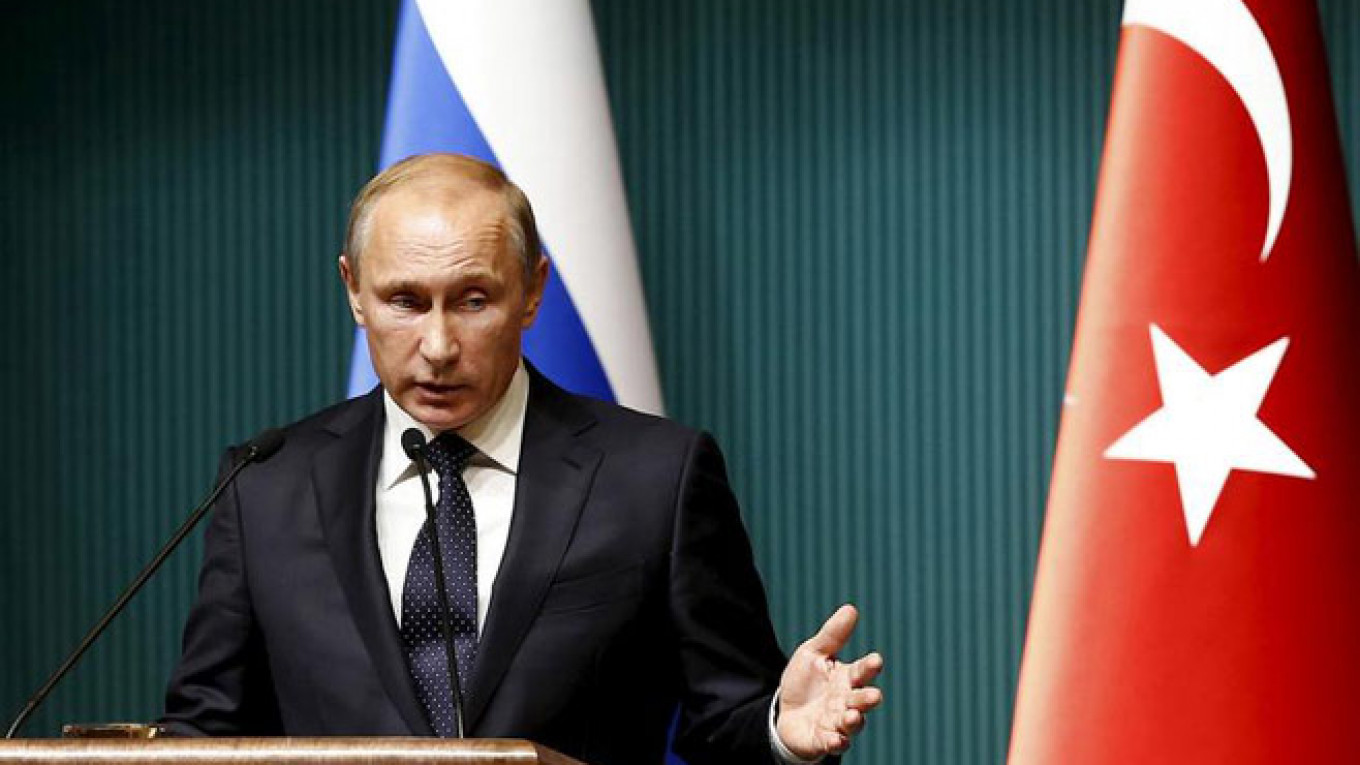Fighter aircraft from NATO member Turkey shot down a Russian Su-24 military plane along the Turkish-Syrian border on Nov. 24. One of the pilots, Lieutenant Colonel Oleg Peshkow, was killed as a result. Not since a Soviet sentry shot U.S. Army Major Arthur Nicholson in 1985, has there been a shooting death between the forces of Russia and members of NATO. ?
Russian President Vladimir Putin immediately threatened "serious consequences" for what he called a stab in the back. He characterized the Turkish government as "the accomplices of terrorists."? Russia deployed longer range air defense systems to Syria while Turkish President Recep Erdogan threatened that any shootdown of a Turkish aircraft would be considered an "act of aggression" which might bring NATO into the conflict.
As tensions peaked between Russia and Turkey, Putin and Erdogan did what many leaders have done before — they began shutting down diplomatic and military channels of communication.? This incident highlights the danger posed when two adversaries break off important channels of communication at a time when dialogue is most necessary. The potential for escalation and miscalculation becomes even greater.?
In October, the Elbe Group — a group of six U.S. and six Russian retired general officers — met for the seventh time in five years and urged NATO and Russia to open a military-to-military dialogue immediately to communicate on military operations in proximity to each other's borders.
The Elbe Group recommended this policy because it was convinced that an accidental shootdown or clash of forces was inevitable considering the concentration of U.S., NATO, and Russian troops along the Turkish-Syrian border.
The group includes such senior U.S. veterans as former CENTCOM Commander General John Abizaid, former STRATCOM Commander General Eugene Habiger and former Defense Intelligence Agency Director Lieutenant General Michael Maples, as well as Russian counterparts such as former Interior Minister General Anatoly Kulikov, former Military Intelligence Chief General Valentin Korabelnikov and former FSB Deputy Head General Anatoly Safonov. ?
In a joint statement reflecting the opinion of both the U.S. and Russian members, the Elbe Group recommended renewed "contacts between Russia and NATO, given that combat operations in Syria are being conducted near the border of a NATO member state."
The shootdown of the Russian fighter underscores the urgency of the recommendation.? Transparency about operations, force dispositions, and intentions is key to avoiding miscalculation or misunderstanding that could lead to unintended consequences.
In that light, the Elbe Group commended the recent agreement between Russia and the U.S. to "deconflict" operations in Syria, but urged that it be expanded to include "practical steps for coordination and actions in the fight against the Islamic State." For example, the agreement reached in October does not provide for cooperation in rescuing downed pilots.? ?
It is important to recognize how serious the situation has become between Russia and NATO over the last two years. In response to Russia's annexation of Crimea and its activities in Ukraine, almost all operational communications between the militaries of NATO and Russia have been suspended.
Even if it is not possible to reconcile the two sides politically and diplomatically, it is vital that a military dialogue reopen now to provide national leaders with a means to deconflict and resolve security issues without resorting to force. ?
This kind of dialogue was able to keep the Cold War "cold" and is needed again.
Retired Brigadier General Kevin Ryan is director of Defense and Intelligence Projects at Harvard Kennedy School's Belfer Center and organizer of the Elbe Group. He served as U.S. defense attach?? to Moscow from 2001-2003.
A Message from The Moscow Times:
Dear readers,
We are facing unprecedented challenges. Russia's Prosecutor General's Office has designated The Moscow Times as an "undesirable" organization, criminalizing our work and putting our staff at risk of prosecution. This follows our earlier unjust labeling as a "foreign agent."
These actions are direct attempts to silence independent journalism in Russia. The authorities claim our work "discredits the decisions of the Russian leadership." We see things differently: we strive to provide accurate, unbiased reporting on Russia.
We, the journalists of The Moscow Times, refuse to be silenced. But to continue our work, we need your help.
Your support, no matter how small, makes a world of difference. If you can, please support us monthly starting from just $2. It's quick to set up, and every contribution makes a significant impact.
By supporting The Moscow Times, you're defending open, independent journalism in the face of repression. Thank you for standing with us.
Remind me later.


